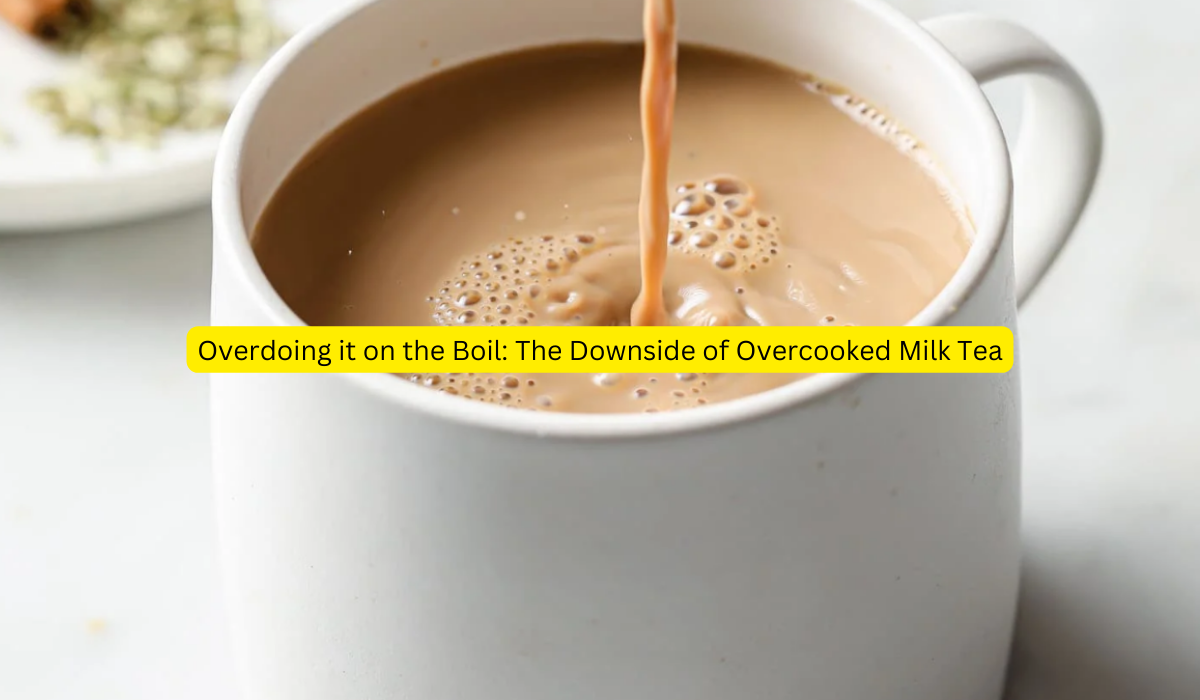There’s nothing quite like a steaming cup of milk tea to warm your soul or quench your thirst on a hot day. But have you ever gotten a little too enthusiastic with the kettle, leaving your milk tea bubbling away for far too long? Fear not, fellow tea enthusiasts! We’ve all been there. While overboiling might not render your milk tea completely undrinkable, there are some consequences to be aware of. So, let’s delve into the world of overcooked milk tea and explore what happens when you take the boiling business a bit too far.
A Symphony of Flavors Gone Flat: Sacrificing the Delicate Balance
Milk tea is a beautiful dance between the subtle flavors of tea leaves and the creamy richness of milk. Unfortunately, overboiling can disrupt this delicate harmony. Here’s how:
- Bitter Brew: Tea leaves, when subjected to prolonged boiling, release more tannins, the compounds responsible for that bitter taste. Imagine steeping a tea bag for way too long – that’s the bitterness you can expect in overcooked milk tea.
- Farewell Fragrance: The volatile aromatic compounds in tea leaves, which contribute to the fragrance and aroma, can be lost through prolonged boiling. Think of a bouquet of flowers left in the sun for days – their delightful scent fades. Overboiled milk tea can suffer a similar loss of its fragrant charm.
- Burnt Milk Blues: Milk doesn’t handle extreme heat well. Overboiling can cause scorching, leading to a burnt taste in your milk tea. Imagine a perfectly caramelized crème brûlée – take that deliciousness a step too far, and you get the burnt flavor of overcooked milk tea.
These flavor alterations can significantly diminish the enjoyment of your milk tea experience.
Beyond Taste: Potential Nutritional Woes
While taste is a major concern, overboiling milk tea might also have some nutritional implications:
- Vitamin Woes: Milk, especially, is a good source of vitamins B12 and C. Unfortunately, prolonged boiling can degrade these heat-sensitive vitamins, reducing their nutritional value.
- Protein Blues: Excessive heat can denature proteins in milk, affecting their structure and potentially making them less digestible.
Thankfully, the impact on nutrient content might not be significant unless you consistently overcook your milk tea.
Safety First: Avoiding Unintended Consequences
While overboiling milk tea doesn’t pose a major safety hazard, there are a few things to keep in mind:
- Scalding Risk: Boiling water can cause serious burns. Be cautious when handling hot liquids, especially with children around.
- Milk Scorching: Overboiled milk can scorch pots and pans, leaving a stubborn residue that can be a pain to clean.
By keeping these safety considerations in mind, you can avoid any unwanted consequences associated with overboiling milk tea.
Brewing Bliss: How to Achieve Perfect Milk Tea
Now that we’ve explored the not-so-good side of overboiling, let’s get back on track to brewing perfect milk tea:
- Follow the Time: Most black tea varieties used in milk tea benefit from a steeping time of 2-3 minutes. Green tea steeps for an even shorter time. Pay attention to the specific tea you’re using and adjust the steeping time accordingly.
- Temperature Matters: Avoid boiling water for milk tea. Ideally, aim for water just below boiling (around 195°F or 90°C). Think of it as simmering rather than boiling.
- Low and Slow is the Way to Go: Once you’ve added the milk, reduce the heat and simmer gently. Don’t let it reach a full boil again.
By following these simple tips, you can achieve deliciously balanced milk tea with perfect flavor and texture.
Conclusion
While a little overenthusiasm with the kettle can lead to less-than-ideal milk tea, it doesn’t have to spell disaster! By understanding how overboiling affects flavor, potential nutrient content, and safety, you can adjust your brewing technique for a consistently delicious cup. So, next time you’re crafting a cup of milk tea, remember: patience and gentle steeping are the keys to a flavorful and enjoyable brew.
Frequently Asked Questions
1. Is overcooked milk tea still safe to drink?
Overcooked milk tea is generally safe to drink in moderation. However, the potential loss of nutrients and the unpleasant burnt taste might not be ideal. If the bitterness is overwhelming, it’s best to discard the tea and start fresh.
2. Can I salvage overcooked milk tea?
There are limited ways to salvage overcooked milk tea. Here are a couple of options:
- Add More Milk: If the burnt taste is mild, you can try adding a splash of fresh, cold milk to dilute the burnt flavor slightly.
- Sweeten it Up: A touch of honey or sugar might help mask some of the bitterness, but it won’t restore the lost volatile aromatic compounds or the delicate tea flavor.
3. What type of milk is best for milk tea?
Whole milk is a popular choice for milk tea due to its creamy texture and richness. However, you can experiment with different milk options based on your preference. Here are some ideas:
- Skim or Low-Fat Milk: These offer a lighter option while still providing some creaminess.
- Plant-Based Milk Options: Almond milk, oat milk, or coconut milk can be used for a dairy-free alternative. Keep in mind that these milks might alter the taste and texture slightly compared to traditional milk tea.
4. Can I reuse overcooked milk tea?
Technically, yes, you can reuse overcooked milk tea in baking or cooking applications where the burnt flavor might not be as noticeable. However, due to the potential loss of some nutrients, it might be best to use fresh milk for optimal results.
5. How can I prevent overboiling milk tea in the future?
Here are some tips to prevent overboiling milk tea:
- Use a timer: Set a timer for the recommended steeping time for your specific tea.
- Low and slow: Once you add milk, reduce heat to low and simmer gently. Avoid letting it reach a full boil again.
- Invest in a teapot with a whistle: These teapots alert you when the water reaches boiling temperature, helping you avoid overboiling.

